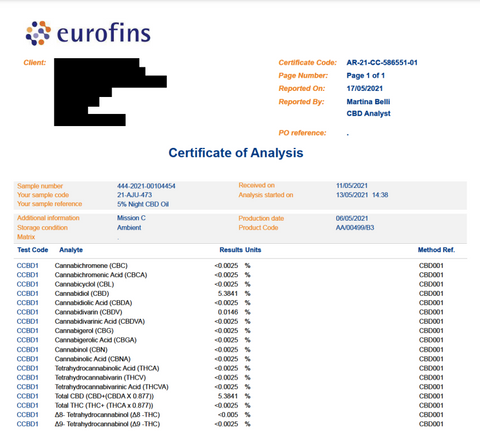If you’ve purchased a CBD product before, you might know that it’s important to buy from a brand that can provide third-party laboratory test reports for each of its products. As the demand for products such as CBD oils, gummies, balms and creams continues to grow, competition between manufacturers is high, but the industry remains largely unregulated. This has, unfortunately, attracted a few less-than-reputable CBD brands, so it’s even more crucial to do your research and check CBD third-party lab reports to ensure you are getting your money’s worth.
The trouble is, CBD lab reports can be difficult to locate and, let’s face it, their contents can be downright perplexing. Too many consumers remain unaware of the importance of checking for a third-party lab report, while others are unsure of what to look for within the analysis. In this article we'll delve into everything you need to know from the important of CBD lab reports and what to look for to ensure you are purchasing high-quality, pure, safe and authentic products.
What is a CBD Lab Report?
A CBD lab report, also known as a Certificate of Analysis (COA), is a document which is created after a CBD product is sent to an independent laboratory to undergo testing. The product is tested to determine the content and strength of CBD and additional cannabinoids (in percentage or mg/g), as well as any synthetic chemicals such as pesticides, herbicides, fertilisers and growth hormones. The resulting lab report will state the potency (strength) of the product and a list of any included cannabinoids and chemicals.
Example of an Independent CBD Lab Report (Product: Mission C 5% Night + CBD Oil)

The Importance of Third-Party CBD Lab Testing
CBD lab reports are important for a number of reasons. First, they provide consumers with an independent third-party analysis of a product's cannabinoid content. This is important because it allows consumers to know exactly what they are getting when they purchase CBD products; it is an unbiased review which gives an insight into the quality of the CBD product being considered for purchase. Secondly, lab reports can also help to ensure that products contain the advertised amount of CBD. Finally, lab reports can help to ensure that products are free of contaminants.
Since there is currently no quality or content control for CBD products in the UK general consumer market, and the industry is growing at a rapid rate, the quality of products is hit and miss. As a consumer, it is important to do your research and shop around.
What To Look For in a CBD Lab Report
We encourage customers to only purchase CBD from brands that are transparent when it comes to their products, and that means providing lab reports for each item. For you as a consumer, it’s important to take time to read the lab analysis so that you are clear on what it is, exactly, that you are consuming or using on your body.
First and foremost, you should be checking the content of CBD in your product to ensure that levels equal the manufacturer’s claim. You should also check the THC (tetrahydrocannabinol) content. It is normal to find tiny levels of THC in a CBD product but to comply with UK law, it should not contain more than 0.2%. This is to ensure that the product will not cause a ‘high’.
It’s advisable to also check the cannabinoid profile, and that there are no additional components such as pesticides and herbicides present.
What Should and Shouldn’t Be Present in CBD Products?
Components that should be present:
- CBD. The concentration should match the manufacturer’s claim on the product label.
- THC. There is usually a very small concentration of THC (below 0.2%) in products infused with full-spectrum and broad-spectrum CBD. THC should not be present in products that are infused with pure CBD isolate.
- Additional cannabinoids and terpenes – full-spectrum CBD and broad-spectrum CBD products contain additional components derived from the hemp plant, such as CBG.
Components that should not be present:
- In pure CBD isolate products, THC and additional cannabinoids should not be listed.
- Synthetic chemicals such as pesticides and herbicides
- Mycotoxins
- Yeast
- Microbials
- Mould
Mission C’s Third-Party Lab Test Results
At Mission C, we want to ensure that our customers know exactly what they're getting. That's why we provide batch test results for every CBD product we produce, so you can be sure of the safety, legality, and quality of your purchase.
Consumers can find independent third-party lab reports for each Mission C product via our CBD Batch Test Results page. Simply enter the product name or barcode number of your product to view the results.





















